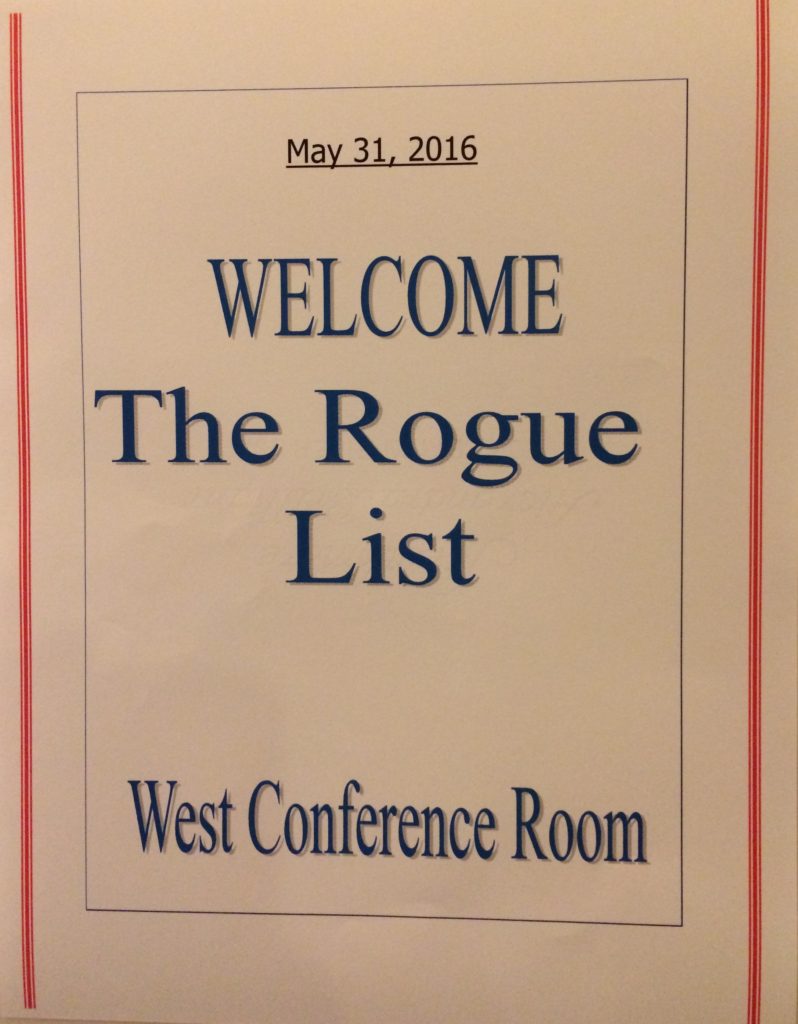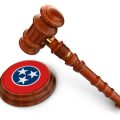It came as a shock to everyone in our informal listserv group that was sworn in on Tuesday to the Supreme Court bar.
When we entered the building, we were asked what group we were from. Ummm, each of us stuttered, a group of trial lawyers from New York organized by Jay Breakstone?
“You guys the Rogues?”
Holy shit! The SCOTUS marshals and clerks knew the jokey name of our informal listserv!? No way!
We were at first startled and flabbergasted, then astounded and amazed. Our little group of 28 New York personal injury lawyers, plaintiffs-side only, walked up the interior stairs of the Court, following those clerks and marshals, who all knew we were “the Rogues,” pointing us in the right direction.
Rogue was the nickname bequeathed upon us 15 years ago, as local legend goes, when we banded together outside the confines and restrictions of any official bar association. A member of the “official” bar association listserv called us rogues for doing our own thing, and as one friend notes, “We took it and ran with it.”
The vast majority of us were solo and small firm practitioners, who simply recognized a need to share information as we litigated against significantly more powerful interests. If we were truly independent we could talk about any issue, and this was a win-win for all participants.
Mostly, this is the type of information that any hyper-local group of niche practitioners would want to share: Can you believe that decision yesterday in Rogue v. Carrier? What are the skills and temperament of opposing counsel? Does anyone have information on Jane Expert? Does Judge Jones skew toward the defense? And for god’s sake, it’s “Leave the gun, take the cannoli,” not the other way around.
In my first job out of law school, finding and sharing information wasn’t really an issue. Like most folks at medium or large firms I could just poke my head into someone else’s office, or chat at lunch, about a particular issue. Not so, however, for the solo practitioner.
Over the last 200+ years, lawyers have shared information outside their firms in a variety of informal and formal ways — perhaps at taverns over our first hundred years as a nation, and at formal bar association meetings and dead-tree publications over the second hundred.
And now as we soar through our third hundred years, we quickly share things electronically. The more knowledge we have, the better we can help our clients. Previously this information passed slowly, and now it passes instantaneously.
Such listservs exist all over the country, and likely all over the world. And while the existence of such listservs isn’t exactly a secret, the contents of the communications obviously are. If a lawyer wanted to share tips on opposing counsel Leo Drummond, for example, it might be helpful if Drummond didn’t know.
I first wrote about my particular group in 2008, in The Million Dollar Listserv, when knowledge of a change in the law was discussed and I was able to race to the courthouse to beat a filing deadline as a result — to the huge benefit of my client. The next time my group met at a big, informal dinner, I bought the first round of drinks. It was my way of showing appreciation to an extraordinary group of people who were helping each other.
Over time, our group met up both at continuing informal dinners as well as at formal lawyer functions, and we put faces and personalities to the names that were attached to our digital messages. The growth of the group then led to shout-outs at some of those bar functions. But the public discussion of actual details was, and remains today, absolutely verboten.
Many judges soon came to realize that this underground group existed, despite the lack of any address, phone, fees, formal publications or legal standing of any kind.
This change in how legal knowledge is shared was in full effect Tuesday in the Supreme Court of the United States as we saw the name of our informal listserv adorning the conference room door.
But wait. There’s more.
Because we eventually marched in to the courtroom for the motion to be admitted to the bar. Breakstone was called to the lectern. And Chief Justice John Roberts specifically spoke the name of our private little listserv in open court. From his perch on the highest bench in the land.
It’s kinda amazing to see a private listserv mentioned not just in open court, but being mentioned in this particular court.
When Justice Ruth Bader Ginsburg met with us afterward, her first question had to do with the Rogue list name. And Breakstone explained, on behalf of the group, of the need for small practitioners to band together to help level the playing field with the sharing of information.
There isn’t anybody that could have conceived, 15 years ago when the listserv was started via email exchanges, that this would have happened. But it did.
I attribute this to a confluence of events, including not just the advancement of technology but the recognition that all of us can benefit from additional knowledge when trying to represent a client. There is a need to share, there is a technology to do it, and the two met up quite nicely.
Ironically, court-watcher Dahlia Lithwick wrote in Slate yesterday about Tuesday’s proceedings. From her vantage point in the press gallery the day was a yawner, with the judges appearing bored out of their minds. She wrote in her lede:
Sitting in the press section at the Supreme Court this spring is a lot like sitting on the bridge of the Starship Enterprise when Captain Kirk has been forced to downgrade life support to minimum. Lights seem to flicker gently. Dazed reporters drift down the halls like tumbleweeds. On Tuesday, Justice Samuel Alito didn’t even show up for opinion announcements.
It’s funny how the same day and same events look vastly different when viewed through different prisms. She sees boredom while I see a centurial change in the way that lawyers acquire and share information.
It isn’t enough at this point, to simply tip my hat to my fellow Rogues. What is important, I think, is that each practitioner, especially the small firms in niche areas, find (or create) that band of brothers and sisters to share your mutual knowledge and experience.
You never know where that need to share information may lead.
SOURCE: New York Personal Injury Law Blog – Read entire story here.








